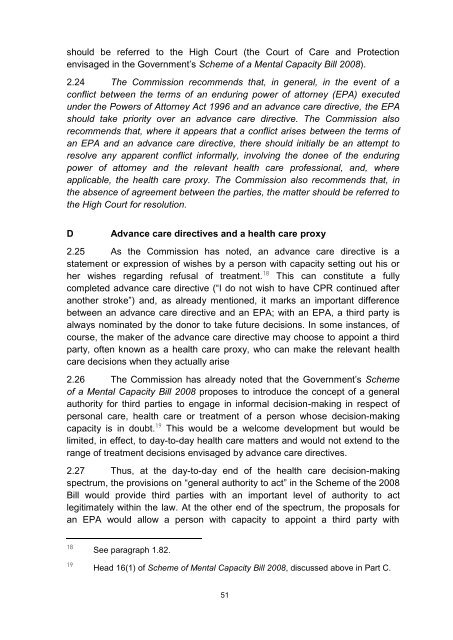Report on Bioethics: Advance Care Directives - Law Reform ...
Report on Bioethics: Advance Care Directives - Law Reform ...
Report on Bioethics: Advance Care Directives - Law Reform ...
Create successful ePaper yourself
Turn your PDF publications into a flip-book with our unique Google optimized e-Paper software.
should be referred to the High Court (the Court of <strong>Care</strong> and Protecti<strong>on</strong>envisaged in the Government‘s Scheme of a Mental Capacity Bill 2008).2.24 The Commissi<strong>on</strong> recommends that, in general, in the event of ac<strong>on</strong>flict between the terms of an enduring power of attorney (EPA) executedunder the Powers of Attorney Act 1996 and an advance care directive, the EPAshould take priority over an advance care directive. The Commissi<strong>on</strong> alsorecommends that, where it appears that a c<strong>on</strong>flict arises between the terms ofan EPA and an advance care directive, there should initially be an attempt toresolve any apparent c<strong>on</strong>flict informally, involving the d<strong>on</strong>ee of the enduringpower of attorney and the relevant health care professi<strong>on</strong>al, and, whereapplicable, the health care proxy. The Commissi<strong>on</strong> also recommends that, inthe absence of agreement between the parties, the matter should be referred tothe High Court for resoluti<strong>on</strong>.D<strong>Advance</strong> care directives and a health care proxy2.25 As the Commissi<strong>on</strong> has noted, an advance care directive is astatement or expressi<strong>on</strong> of wishes by a pers<strong>on</strong> with capacity setting out his orher wishes regarding refusal of treatment. 18 This can c<strong>on</strong>stitute a fullycompleted advance care directive (―I do not wish to have CPR c<strong>on</strong>tinued afteranother stroke‖) and, as already menti<strong>on</strong>ed, it marks an important differencebetween an advance care directive and an EPA; with an EPA, a third party isalways nominated by the d<strong>on</strong>or to take future decisi<strong>on</strong>s. In some instances, ofcourse, the maker of the advance care directive may choose to appoint a thirdparty, often known as a health care proxy, who can make the relevant healthcare decisi<strong>on</strong>s when they actually arise2.26 The Commissi<strong>on</strong> has already noted that the Government‘s Schemeof a Mental Capacity Bill 2008 proposes to introduce the c<strong>on</strong>cept of a generalauthority for third parties to engage in informal decisi<strong>on</strong>-making in respect ofpers<strong>on</strong>al care, health care or treatment of a pers<strong>on</strong> whose decisi<strong>on</strong>-makingcapacity is in doubt. 19 This would be a welcome development but would belimited, in effect, to day-to-day health care matters and would not extend to therange of treatment decisi<strong>on</strong>s envisaged by advance care directives.2.27 Thus, at the day-to-day end of the health care decisi<strong>on</strong>-makingspectrum, the provisi<strong>on</strong>s <strong>on</strong> ―general authority to act‖ in the Scheme of the 2008Bill would provide third parties with an important level of authority to actlegitimately within the law. At the other end of the spectrum, the proposals foran EPA would allow a pers<strong>on</strong> with capacity to appoint a third party with1819See paragraph 1.82.Head 16(1) of Scheme of Mental Capacity Bill 2008, discussed above in Part C.51
















